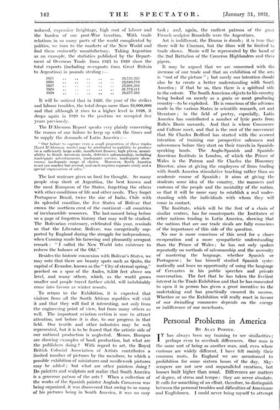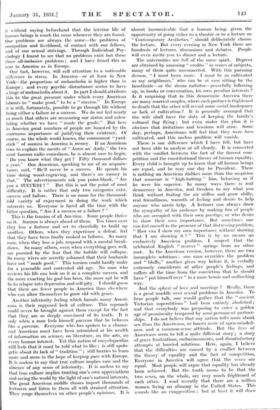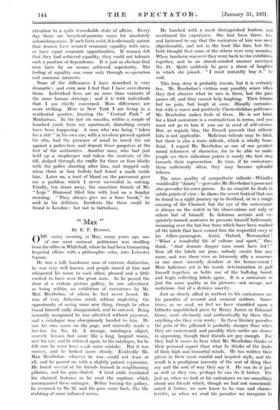Personal Problems in America
BY ALAN PORTER.
IT has always been my training to see similarities ; perhaps even to overlook differences. One man is the same sort of being as another man, and, even where customs are widely different, I have felt mainly their common roots. In England we are accustomed to prohibition for some sixteen hours of the day. Sky- scrapers are not new and unparalleled creations, but houses built higher than usual. Differences are matters of degree, of stress and tempo : they are never absolute. It calls for something of an effort, therefore, to distinguish between the personal troubles and difficulties of Americans and Englishmen. I could never bring myself to attempt it without saying beforehand that the interior life of human beings is much the same wherever they are found. Our problems are always the same—the problems of occupation and livelihood, of contact with our fellows, and of our sexual strivings. Through Individual Psy- chology I learnt to see that no problems exist but these three all-inclusive problems ; and I have found this as true in America as in Europe.
One fact, however, will call attention to a noticeable difference in stress. In America—or at least in New York—the proportion of melancholia is higher than in Europe ; and every psychic disturbance seems to have a tinge of melancholia about it. In part I should attribute this to the great pressure under which every American labours to " make good," to be a " success." In Europe it is still, fortunately, possible to go through life without being either a failure or a success. We do not feel nearly so much that others are measuring our status and calcu- lating whether we have " made the grade." But here in America great numbers of people are haunted by the enormous importance of justifying their existence. Of course, as the whole world knows, the commonest "yard- stick " of success in America is money. If an American tries to explain the merits of " Amos an' Andy," the two most famous radio comedians, he is almost sure to begin, " Do you know what they get ? Fifty thousand dollars a year." One American, speaking to me of an acquain- tance, said, " He'll never be a success. He spends his time doing wood-engraving, and there's no money in that." The advertisements ask you point-blank, " Are you a SUCCE$$ ? " But this is not the point of most difficulty. It is rather that only two categories exist, success and failure. There is no room for the thousand- fold variety of enjoyment in doing the work which interests us. Everyone is faced all the time with the bitter question, " Am I a success or a failure ? " .
This is the tension of all America. Some people thrive on it. Success is always ahead of them. Ten times over they lose a fortune and set to cheerfully to build up another. Others, when they experience a defeat, feel that they have been finally ranked as failures. So many men, when they lose a job, respond with a mental break- down. So many others, even when everything goes well, are pursued by the fear that the bubble will collapse. So many wives are secretly ashamed that their husbands have not " made good." This tension could hardly make for a peaceable and contented old age. No man who reviews his life can look on it as a complete success, and the more exacting his goal has been, the more apt he will be to relapse into depression and self-pity. I should guess that there. are fewer people in Americci than elsewhere who can allow themselves to grow old with grace.
Another inferiority feeling which haunts many Ameri- cans is their supposed lack of culture. This reproach could never be brought against them except for the fact that they, are so deeply, convinced of its truth. It is only when a man feels himself parvenu that he behaves like a parvenu. Everyone who has spoken to a chance- met American must have been astonished at his wealth of information on science, on literature, on the arts, on every human interest. Yet this nation of encyclopaedias still feels that it must be told what to like ; is still apolo- getic about its lack of " tradition " ; still hurries to learn more and more in the hope of keeping pace with Europe. It is useless to say that true culture implies ease and the absence of any sense of inferiority. It is useless to say that true culture implies trusting one's own appreciations and seeing the world by the light of one's natural interests. The great American middle claSses import thousands of lecturers and listen to them all with strained attention. They gorge themselveS on other people's opinions. It is almost inconceivable that a human being, given the opportunity of going either to a theatre or to a lecture on " Contemporary Aesthetics " should deliberately choose the lecture. But every evening in New York there are hundreds of lectures, discussions and debates. People will even invite you to dinner and a lecture.
The universities are full of the same spirit. Degrees are obtained by amassing " credits " in scores of subjects, many of them quite unconnected. With this pursuing demon, " I must learn more. I must be as cultivated as my neighbours," who can be at ease sitting by the hearthside—or the steam radiator—peacefully following up, in books or conversation, his own peculiar interests ? Is it surprising that in this democratic America there are many married couples, where each partner is frightened to death that the other will reveal some social inadequacy or lack of cultivation ? It is generally arranged that the wife shall have the duty of keeping the family's cultural flag flying ; but even under this plan it is obvious that irritations and tensions will arise. Some day, perhaps, Americans will feel that they were born cultivated, and this useless problem will vanish.
There is one difference which I have felt, but have not been able to analyse at all clearly. It is connected with the conflict between the fact of the fiercest com- petition and the constitutional theory of human equality. Every child is brought up to know that all human beings are equal, and he may one day be President. There is nothing an American dislikes more than the suspicion that someone is " high-hatting " him, behaving as if he were his superior. In . many ways there is real democracy in America, real freedom to say what you think without finding the air stiffen and grow chilly, real friendliness, warmth of feeling and desire to help anyone who needs help. A lecturer can always draw the sympathy of his audience by making fun of people who are occupied with their own prestige, or who desire to show their own importance. But sometimes one can feel oneself in the presence of that distressing problem, " How can I show my own importance without showing that I am showing it ? " This is by no means an exclusively American problem. I suspect that the celebrated English " reserve " springs from no other root. In the American version, however, therd are two incomplete solutions : one man overrides the problem and " bluffs," another gives way before it, is verbally extremely considerate of other people's feelings, and suffers all the time from the conviction that he should have " put himself over " in a more heroic and unflinching way.
And the sphere of love and marriage ? Really, there is a great muddle over sexual problems in America. To hear people talk, one would gather that the " ancient Victorian superstitions " had been entirely abolished and that everybody was preparing to enter a golden age of promiscuity tempered by semi-permanent partner- ships. I do not believe that any nation talks more about sex than the Americans, or boasts more of open-minded- ness and a common-sense attitude. But the lives of Americans seem to tell a quite different story ; a story of grave frustrations, embarrassments, and dissatisfactory attempts at hurried solutions. Here, again, I believe that the difficulties are caused by a conflict between the theory of 'equality and the fact of competition, Everyone in America will agree that the sexes are equal. Most people will argue that equality has already been achieved. But the truth seems to be that the two sexes, on the whole, are very much frightened of each other. I read recently that there are a million *omen liVing on alimony in the United States. This sounds like an exaggeration ; but at least it will draw attention to a quite remarkable state of affairs. ' Every day there are breach-of-promise eases for 'absolutely astonishing sums. If such facts exist, it is obviously.untrae that women have secured economic equality with men. or have equal economic opportunities. If women felt that they had achieved equality, they could not tolerate such a position of dependence. It is just as obvious that men have by no mauls achieved superiority. The feeling of equality can come only through co-operation and common interests.
None of the differences I have described is very dramatic ; and even now I feel that I have over-drawn them. Individual lives are no more than variants of the same human strivings ; and it is with individuals that I am chiefly concerned. Mass differences are more striking. Here in New York I am living in a residential quarter, fronting the " Central Park" of Manhattan. In the last six months, within a couple of hundred yards from my apartment, disturbing events have been happening. A man who was being " taken for a ride " in his own car, with a revolver pressed against his ribs, had the presence of mind to wreck the ear against a police-box, and deposit three gangsters at the feet of the authorities. Another man, who had just held up a shopkeeper and taken the contents of the till, dodged through the traffic for three or four blocks with the police shooting after him, and stopped only when three or four bullets had found a mark inside him. Later on, a trail of blood on the pavement gave me a problem which I never succeeded in solving. Finally, ten doors away, the sometime friends of Mr. " Legs " Diamond filled him with lead on a Sunday morning. " They always give me a bum break," he said in his delirium. Incidents like these could be found in London ; but not in battalions..








































 Previous page
Previous page